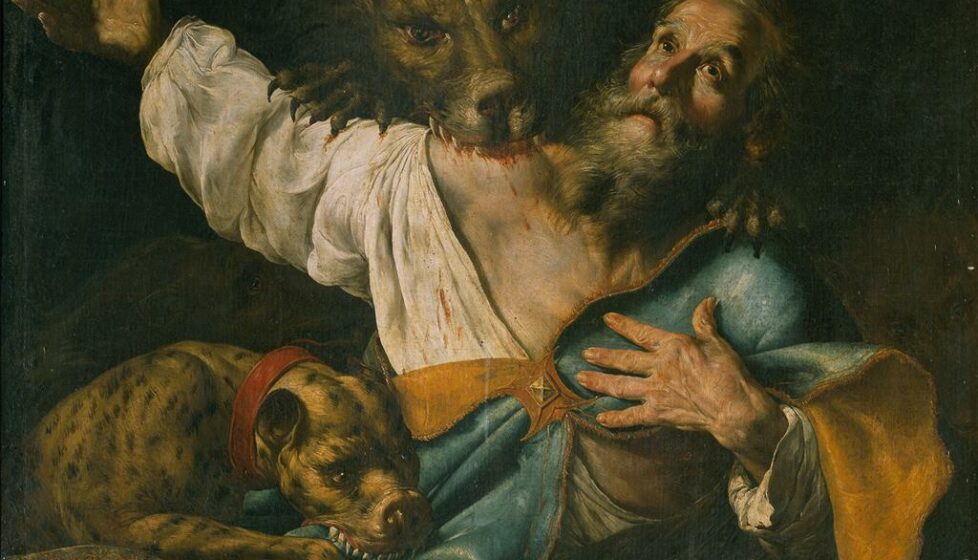Stories of Christian Martyrs: James the Great
Rome

Arrests, beatings, and intimidation had become common. A group
of believers were randomly rounded up and carted off to Herod’s
dungeon. Among them happened to be one of the apostles—
James. The event seemed little more than the usual inconvenient harassment that the Roman leaders felt obligated to perform at the insistence of certain Jewish leaders, who seemed obsessed with the followers of Jesus. But things took a sudden turn when James was hauled out without fanfare and summarily executed by the sword. The church in Jerusalem was stunned; their opponents were elated (Acts 12:1-2).
James’s death turned out to be a political experiment on Herod’s
part. He must have been sick and tired of the bickering in his court
over the Christ-followers who seemed to be spreading like an infection. They didn’t do anything wrong except provoke extreme hatred
from others. But when the old politician saw the excited response to
James’s death among his political allies, Herod decided he could
afford to eliminate a few more of these Christians. His attempt to kill
Peter failed, and before he could devise a further plan, he was distracted by a crisis in another part of his kingdom. Herod died shortly
thereafter when “an angel of the Lord struck him down, because he
did not give God the glory, and he was eaten by worms and breathed
his last” (Acts 12:23).

James, the son of Zebedee, has the noteworthy distinction of being
the first apostolic martyr. His death came within fourteen years of Jesus’s
resurrection and ascension. Only Stephen anteceded James among the
well-known early martyrs. Stephen’s death and Saul’s persecution must
have made it clear to the apostles that things were not going to go well
in the area of personal safety. After all, His presence, not preservation,
had been Jesus’s promise in the Great Commission, when He said, “And
behold, I am with you always, to the end of the age” (Matthew 28:20).
Curiously, James and his brother John were confronted by Jesus at
one point after their mother asked the Lord for a special privilege for her
sons. Jesus asked, “Are you able to drink the cup that I am to drink?”
(Matthew 20:22). Though they most likely had no idea to what He was
referring, the brothers immediately said, “We are able.” They thought
they were about to get a privilege above the other ten disciples.
Jesus responded, “You will drink My cup…” (Matthew 20:23). His
words were prophetic. James was the first to die; John the last. Their
deaths formed the bookends in the stories of apostolic martyrdom.
Of the three disciples with whom Jesus spent extra time (Peter,
James, and John), we have the least information about James. His own
brother, John, never mentions him (or himself, for that matter) by name
in the gospel he wrote. James, the son of Zebedee, is called “the Great”
merely to differentiate him from James, the son of Alphaeus (“the Less”),
one of the other disciples.
In the context of history, fourteen years doesn’t represent a large
time span. But Jesus’s active ministry covered only three years. The
question becomes, then, what were James and the other apostles doing
during those first fourteen years before James died at the hands of
Herod’s soldiers?
During the years following Jesus’s ascension, an uneasy relationship developed between the growing movement of Christians in Jerusalem, those Jewish leaders who had rejected Christ’s claims and
helped to have Him killed, and the Roman authorities who were
charged with keeping the peace. Order was often maintained by the
use of threats and torture. The early chapters of the book of Acts
provide glimpses of the ebb and flow of the persecution of believers.
But Luke records a significant moment involving Gamaliel, the rabbi
who was Saul’s mentor. He wasn’t opposed to the persecution of believers, but he cautioned his fellow members of the Sanhedrin against
killing Christians. He understood the power of martyrdom. Gamaliel
said, “So in the present case I tell you, keep away from these men and
let them alone, for if this plan or this undertaking is of man, it will fail; but if it is of God, you will not be able to overthrow them. You might even be found opposing God!” (Acts 5:38-39). This tactic of toleration may have kept many believers in Jerusalem and thus slowed down the process of taking the Gospel to the world. Stephen’s and James’s deaths eventually changed all of that. (The fall of Jerusalem in AD 70 scattered the church to the winds.)
The death of Stephen almost seems like an unusual case in which
things got out of hand. But packing Christians off to prison became part
of life in Jerusalem. Saul apparently had success in intimidating Christians to the point that many left Jerusalem for safer places. This had the
benefit of spreading the Gospel, something that Saul certainly didn’t
intend at that point in his life. Nor did he intend to be confronted by the
Lord on the road to Damascus. But when Saul (Paul) defected as the chief
persecuting official of the Sanhedrin, the situation in Jerusalem became
a stalemate again for a number of years.
An ancient church in Spain claims to contain at least some of the
remains of James’s body. This gave rise to the tradition that James may
have left Jerusalem for a number of years on a mission journey to Spain
before his death. There seems to be little reason why Luke would not
have included some reference in Acts to that effect among his notes about
outreach. But it does appeal to our pioneering view of missions that one
of the apostolic fishermen would embark for a long voyage to the far end
of the Mediterranean—the ends of the earth—and seek to carry out
Christ’s commission there.
“And you will be hated
by all for my name’s sake.
But the one who endures
to the end will be saved.”
Mark 13:13
This story is an excerpt from Foxe: Voices of the Martyrs. You can get your own copy free with any donation to The Voice of the Martyrs.

